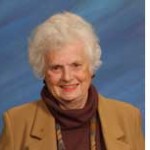By Natasha Josefowitz, PhD

LA JOLLA, California — The Paris of the 1920s had cobblestone streets and horse-drawn carriages delivering milk in glass bottles with the cream on top—reserved for my father for his café au lait. Coal was thrown down a chute at the base of our apartment building, and blocks of ice were hauled up the stairs on men’s shoulders and delivered into our aptly named iceboxes.
When my grandmother called my father to say that a redheaded girl had been born, he just hung up, disappointed. He had hoped for a boy. My mother called me Natasha after her favorite character in Tolstoy’s War and Peace.
It was the custom to hire a wet nurse to breastfeed babies so that the mother could get back to her normal life. My niania (nanny) was Russian, so that was my first language. I had milk brothers and sisters, the children who she had nursed. This created a special bond, and I remained friends with my milk sister whose name was also Natacha (the French spelling of my name).
My niania was Russian Orthodox, so she took me to church on Sundays. I have a strong memory of burning incense and Gregorian chants. I prayed to baby Jesus on my knees every night. My Jewish mother never found out. Perhaps my love of icons comes from that time.
All the children I knew had governesses. It was thought that children were better off being raised by professionals than parents. When I was three years old and fluent in Russian, my niania disappeared without an explanation, and Fräulein Margo appeared. She spoke only German, so I was suddenly bereft of my usual caregiver and left in the hands of someone I could not communicate with. That was the point, to speed up my language acquisition. It worked, and within a short period of time, I was fluent in German. At Christmas time she dressed up as Santa Claus and gave me a burlap sack full of oranges from Palestine—a rare delicacy—and walnuts. I also got a stick to be beaten with when I disobeyed, which happened quite a bit. A German friend of mine also remembers a stick being part of her Christmas package.
At age five, the scenario was replayed: this time it was the fräulein who disappeared and Madame Michelle arrived on the scene to teach me French. By the time it was six, I was fluent in three languages: a good beginning to my education according to my parents.
I can’t imagine how traumatic it must have been as a young child to be suddenly abandoned and confronted with a new person with whom I could not communicate. These kinds of traumas often have repercussions later in life—the fear of abandonment has resurfaced in my life repeatedly.
I had just two toys: a doll and a little toy car. No one had the proliferation of toys that my children later possessed. For my birthday, my mother invited her friends and I performed for them—reciting poetry or singing. There were no other children invited.
We bathed once a week, but used a bidet every day. No one had ever seen a shower, hair was washed once a month and rinsed with rainwater gathered into buckets sitting on our balcony. Mother had chamomile tea and lemon added to the water to make my hair shiny.
When I was six I attended a lycée, with separate entrances for boys and girls. We all wore unattractive beige uniforms. I remember having to stand in line to enter the classroom and the classes being very large. We each had our own desk with a lid. I learned to write with a fountain pen that I dipped into an inkwell. We made slanted lines and circles for pages and pages on lined workbooks to perfect our penmanship.
Later that year, a brother appeared unannounced. My governess said that he was brought by a stork; the cook said she found him in a cabbage. My mother said he came out of her belly—the most unlikely of all the stories. I resented my brother. He was a beautiful baby, blond and chubby, but mostly he was a boy. While he was admired and the center of attention, I stood on the periphery—a skinny, red-headed, freckled, invisible, sullen child. It wasn’t until we were adults that we became friends.
“My Childhood in Paris” will continue in my next column.
*
Josefowitz is an author and freelance writer. This story was published in La Jolla Village News. You may comment directly to natasha.josefowitz@sdjewishworld.com or oost your comment on this website provided that the rules below are observed.
__________________________________________________________________
Your comment should be followed with this information: Your full name, your city and state (or country) of residence. Letters lacking such information will be automatically deleted. San Diego Jewish World is intended as a forum for the entire Jewish community, whatever your political leanings. Letters may be posted below provided they are responsive to the article to which they are affixed, and civil in their tone. Ad hominem attacks against any religion, country, gender, race, sexual orientation, or physical disability will not be considered for publication. There is a limit of one letter per writer on any given day.
__________________________________________________________________